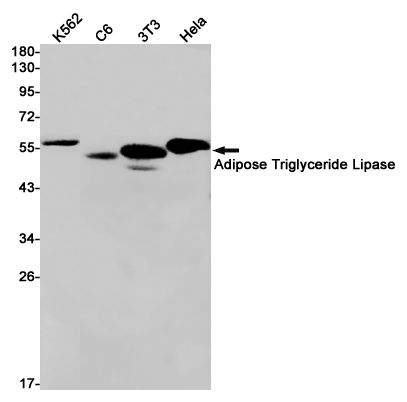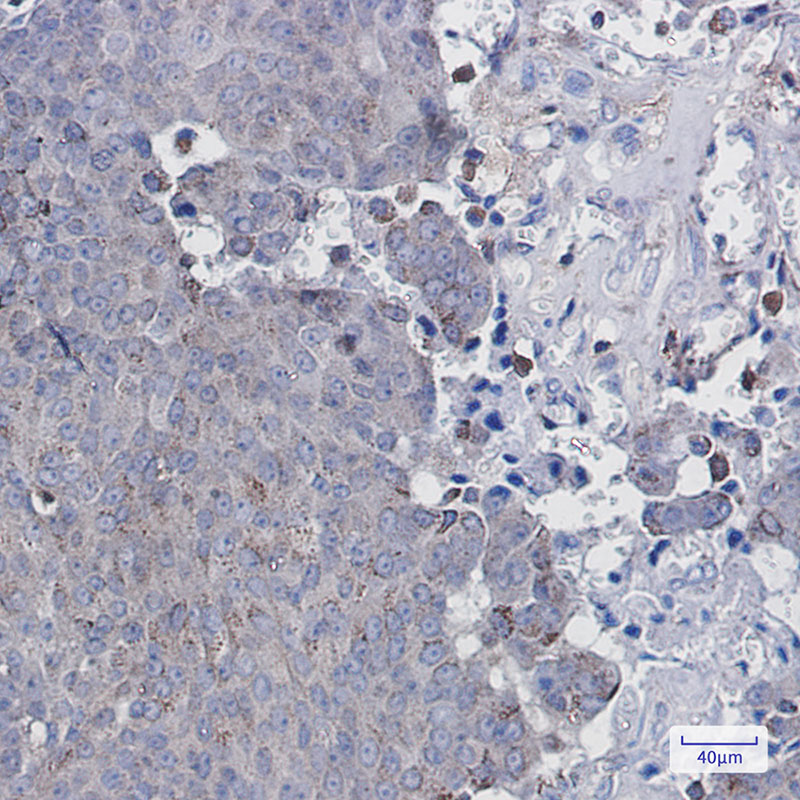

| WB | 咨询技术 | Human,Mouse,Rat |
| IF | 1/20 | Human,Mouse,Rat |
| IHC | 1/50-1/100 | Human,Mouse,Rat |
| ICC | 技术咨询 | Human,Mouse,Rat |
| FCM | 咨询技术 | Human,Mouse,Rat |
| Elisa | 咨询技术 | Human,Mouse,Rat |
| Aliases | ATGL; Desnutrin; plpl; plpl2; Pnpla2; TTS 2.2; TTS2; TTS2.2; ZETA |
| Entrez GeneID | 57104 |
| WB Predicted band size | Calculated MW: 55 kDa; Observed MW: 55 kDa |
| Host/Isotype | Rabbit IgG |
| Antibody Type | Primary antibody |
| Storage | Store at 4°C short term. Aliquot and store at -20°C long term. Avoid freeze/thaw cycles. |
| Species Reactivity | Human,Mouse,Rat |
| Immunogen | Recombinant protein of human Adipose Triglyceride Lipase |
| Formulation | Purified antibody in TBS with 0.05% sodium azide,0.05%BSA and 50% glycerol. |
+ +
以下是关于Adipose Triglyceride Lipase(ATGL)抗体的3篇代表性文献,简要概括作者及内容:
---
1. **文献名称**: *Fat mobilization in adipose tissue is promoted by adipose triglyceride lipase*
**作者**: Zimmermann, R. et al.
**摘要**: 该研究首次克隆并鉴定了ATGL(PNPLA2)的功能,开发了特异性抗体用于检测其在脂肪组织中的表达,证明ATGL是脂肪分解的关键酶,并通过Western blot和免疫组化验证抗体特异性。
---
2. **文献名称**: *Adipose triglyceride lipase and hormone-sensitive lipase are the major enzymes in adipose tissue triacylglycerol catabolism*
**作者**: Lass, A. et al.
**摘要**: 通过基因敲除模型和小鼠实验,利用ATGL抗体比较野生型与突变体中酶的表达水平,证实ATGL与HSL协同调控甘油三酯水解,抗体应用于免疫印迹和免疫荧光分析。
---
3. **文献名称**: *ATGL-mediated lipolysis regulates macrophage polarization via fatty acid-induced PPARδ signaling*
**作者**: Huang, J. et al.
**摘要**: 研究ATGL在巨噬细胞代谢中的作用,使用ATGL抗体检测其表达与定位,发现脂解产物通过PPARδ途径调控炎症反应,抗体特异性通过siRNA敲低实验验证。
---
如需更多文献或具体实验方法细节,可进一步扩展检索范围(如涉及疾病模型或抗体生产商的研究)。
Adipose Triglyceride Lipase (ATGL), encoded by the PNPLA2 gene, is a key enzyme in lipid metabolism, primarily responsible for initiating the hydrolysis of triglycerides into diglycerides and free fatty acids. As the rate-limiting enzyme in lipolysis, ATGL plays a critical role in energy homeostasis, influencing metabolic processes such as β-oxidation, thermogenesis, and lipid storage. Dysregulation of ATGL activity is linked to metabolic disorders, including obesity, insulin resistance, and lipodystrophy, making it a focal point in metabolic research.
ATGL antibodies are essential tools for studying the expression, localization, and function of this enzyme. These antibodies are widely used in techniques like Western blotting, immunohistochemistry, and immunofluorescence to detect ATGL in tissues such as adipose, liver, and muscle. High-quality ATGL antibodies exhibit specificity for distinct epitopes, often targeting regions like the patatin-like domain critical for its catalytic activity. Many commercially available antibodies are validated across species, including human, mouse, and rat models, ensuring broad experimental applicability.
Research utilizing ATGL antibodies has advanced understanding of lipid droplet dynamics, intracellular signaling pathways (e.g., PPARα activation), and cross-talk between metabolic organs. Additionally, these antibodies help investigate ATGL's role in pathological contexts, such as cancer-associated cachexia or cardiovascular diseases, where altered lipid metabolism contributes to disease progression. By enabling precise detection of ATGL expression changes under varying physiological or pharmacological conditions, these antibodies remain indispensable for unraveling the complexities of lipid regulation and developing targeted therapies.
×